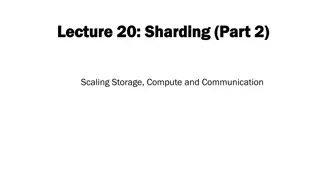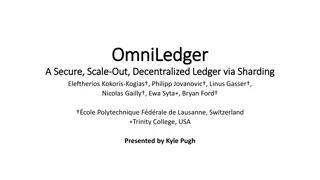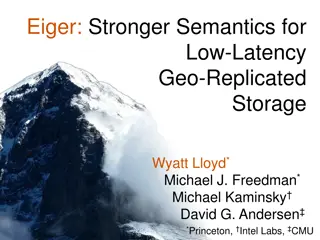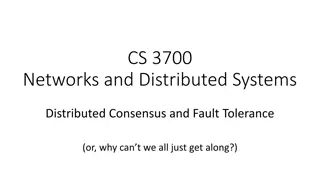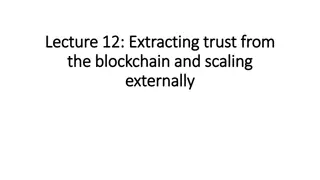Sharding and Scaling in Blockchain: Overcoming Limitations for Improved Performance
Sharding and scaling play a crucial role in enhancing the performance of blockchain networks. This lecture explores how sharding helps distribute the workload efficiently, enabling better storage, computing, and communication scalability. The concept of randomized node allocations and adaptive adver
0 views • 10 slides
OmniLedger: Decentralized Ledger with Sharding
OmniLedger is a decentralized ledger using sharding to enhance scalability without compromising security. It addresses challenges such as validator selection, cross-shard transactions, and checkpointing. The proposed solution includes ByzCoinX for consensus and Atomix for atomic commit. Goals includ
0 views • 13 slides
Stronger Semantics for Low-Latency Geo-Replicated Storage
Discusses the importance of strong consistency and low latency in geo-replicated storage systems for improving user experience and revenue. Various storage dimensions, sharding techniques, and consistency models like Causal+ are explored. The Eiger system is highlighted for ensuring low latency by k
0 views • 24 slides
Understanding Distributed Systems and Fault Tolerance
Exploring the intricacies of distributed systems and fault tolerance in online services, from black box implementations to centralized systems, sharding, and replication strategies. Dive into the advantages and shortcomings of each approach to data storage and processing.
0 views • 78 slides
Enhancing Bitcoin Network Through Trust Extraction and Blockchain Scalability
Explore methods to extract trust from the blockchain and enhance scalability through Layer 1 and Layer 2 changes, including parameters adjustment, consensus algorithm modifications, sharding, payment networks, and side chains. Learn about payment channels, Bitcoin throughput, and strategies to incre
0 views • 23 slides
